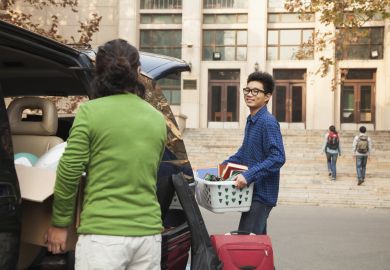While Australian students’ incomes have improved marginally in the past half-decade, many still go hungry, according to a new survey funded by Universities Australia.
More than one in seven say they regularly forgo food or other necessities because they cannot afford them. Four-fifths are forced to work to support themselves, often in unsatisfying jobs that do nothing to boost their careers, and one-third still say their expenses exceed their incomes.
The findings, from a survey of 18,500 students at 38 universities, suggest many battle to survive their years of study. Money is a constant concern, with 58 per cent saying they are worried about their financial situations.
Employment obligations obstruct education, with more than one-quarter of full-time students saying they regularly skip classes to work, and two-fifths saying their jobs impede their study. Part-time students report greater impacts.
Representative group Universities Australia, which funded the survey, said the median annual income for full-time domestic undergraduates was well below the poverty line at A$18,300 (£10,500) a year.
“Education is meant to come first when you are studying,” said chief executive Catriona Jackson. “For some groups of students who live on the financial edge, that’s just not their reality.
“Many are trying to get rent and bills paid. Some are trying to keep food on the table for their own children while juggling paid jobs and studies. Our students should have the basic financial security and stability to perform at their best. That’s simply not the case for many students from disadvantaged groups.”
Unlike their counterparts in England and New Zealand, Australian students cannot borrow money to meet their living costs apart from small “start-up” loans with limited availability. Income support allowances are also limited, with only one-third of survey respondents saying they qualified.
The National Union of Students, which helped run the survey, said the allowances were well short of what was needed to cover essentials. NUS president Mark Pace said their value had not increased in real terms for 24 years.
“The best way to alleviate poverty is access to higher education," he said. "We need to prioritise supporting Australians through higher education and accessing the opportunities it opens.”
The survey found that the median income for most categories of students had risen in real terms since the previous survey in 2012, but only marginally, while their spending had decreased substantially. Annual expenditure by full-time domestic undergraduates had fallen by 22 per cent to A$14,200. “Students are spending less while their incomes have stalled,” UA said.
Register to continue
Why register?
- Registration is free and only takes a moment
- Once registered, you can read 3 articles a month
- Sign up for our newsletter
Subscribe
Or subscribe for unlimited access to:
- Unlimited access to news, views, insights & reviews
- Digital editions
- Digital access to THE’s university and college rankings analysis
Already registered or a current subscriber?








